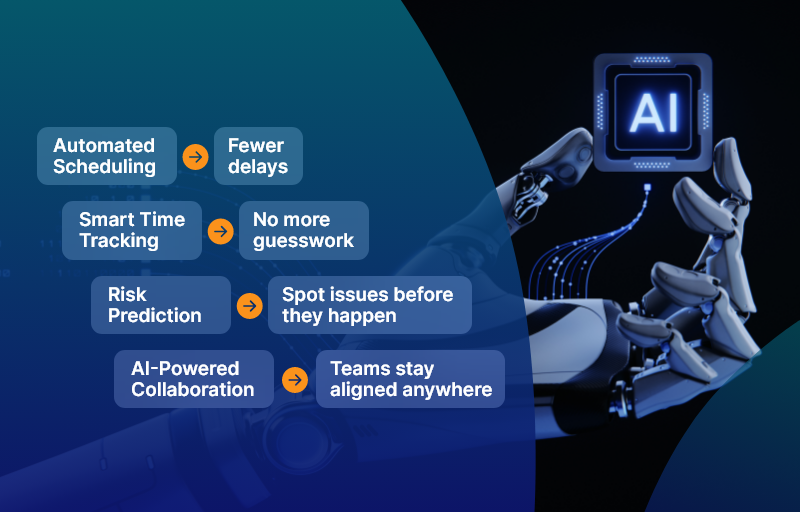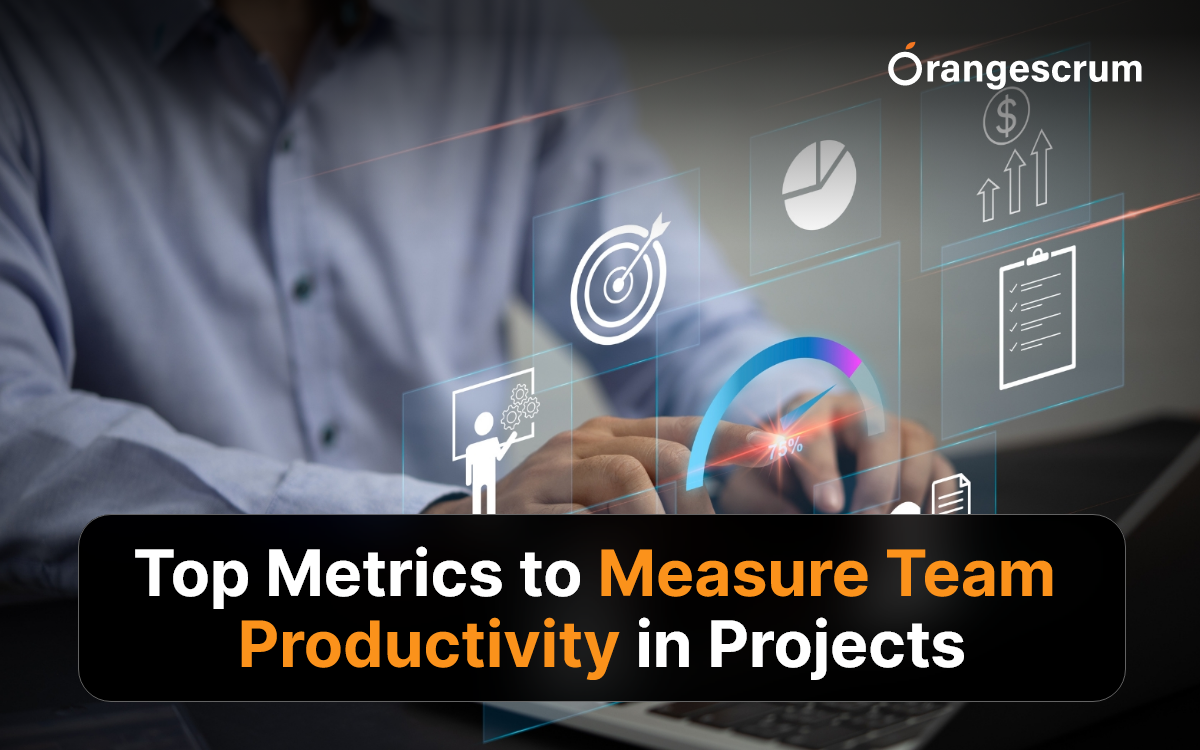Currently Empty: ₹0.00

Is AI really the new project manager? Or is it just another buzzword making waves? Businesses across industries are adopting AI-driven project management software to automate tasks, track time, and optimize workflows. Yet, skepticism remains. Can AI truly replace human managers, or is it only a supporting tool?
In this blog, we’ll cut through the hype and explore what AI in project management software really means. You’ll learn the business case, best practices, and practical frameworks to make sense of AI-driven tools. Plus, we’ll share a success story that proves how companies are already seeing results.
Business Relevance & Why It Matters
AI is no longer futuristic — it’s already embedded in project management tools we use daily. From automated scheduling to intelligent time tracking, AI enhances efficiency and minimizes errors. But here’s the catch: companies that ignore AI risk are falling behind competitors who are already using it to streamline operations.
So, why should businesses care?
- Faster decision-making: AI can process huge datasets from work management software and offer real-time insights.
- Cost savings: Intelligent algorithms help cut unnecessary expenses by improving task management software usage.
- Improved collaboration: AI-driven project collaboration tools make communication seamless across teams, regardless of geography.
Who benefits most?
- Small businesses: They get enterprise-grade intelligence without hiring large teams.
- Enterprises: AI reduces complexity across multi-department projects.
- Remote teams: Automated time tracking software ensures productivity without micromanagement.
The question isn’t whether AI is coming — it’s how prepared your company is to adopt it within your existing project management software.
Best Practices, Frameworks, and Actionable Strategies
Do’s and Don’ts of AI in Project Management
- Do integrate AI with existing workflows. AI thrives when used within current project collaboration software instead of replacing it completely.
- Do use AI for repetitive tasks. Automating reporting, scheduling, and updates allows project managers to focus on strategy.
- Don’t over-rely on AI. Human judgment remains critical in areas like negotiation, stakeholder management, and team motivation.
- Don’t ignore data quality. Poor input leads to misleading AI outputs, weakening your task management tool performance.
Quick Wins You Can Apply Immediately
- Automated scheduling: Let AI auto-prioritize tasks within your project management software based on deadlines and dependencies.
- Smart time tracking: Use time tracking tools with AI that detect idle time, work bursts, and suggest productivity improvements.
- Risk prediction: AI algorithms analyze project histories to highlight potential risks before they occur.
Step-by-Step Framework to Adopt AI
- Assess needs: Identify which pain points—time tracking, collaboration, or reporting—are slowing projects.
- Choose the right tool: Select AI-powered project management software that integrates with your client management tool and existing platforms.
- Train your team: Adoption is smoother when teams understand AI’s role as a partner, not a replacement.
- Start small: Pilot with one feature (like automated scheduling) before scaling.
- Measure ROI: Track time saved, reduced errors, and improved project delivery.
By implementing these steps, businesses can leverage AI while still maximizing the value of their project management tool.
Customer Story
For example, BrightBuild Construction, a mid-sized construction company, adopted AI-powered program management software to handle complex schedules.
Previously, managers struggled with delays and cost overruns. After integrating AI features like automated scheduling and real-time resource allocation, the company reduced project delays by 28% and cut overhead costs by 15%.
Here’s how: AI analyzed past project data to predict risks, auto-assigned resources, and ensured accurate time tracking. As a result, BrightBuild freed its managers from repetitive admin work and redirected their focus toward strategic planning and client relationships.
This is not hype — it’s reality when AI meets project management software.
Key Takeaways & Closing Summary
AI in project management software is not just a passing trend. It’s transforming how teams collaborate, track time, and deliver projects faster.
However, AI is a partner — not a replacement — for human leadership. Businesses that embrace AI-powered project management tools will unlock efficiency, reduce risks, and gain a competitive edge. In short: The hype is real, but the opportunities are even bigger.
AI is changing the rules of project management. By automating routine tasks and enhancing decision-making, AI-powered project management software helps businesses save time, cut costs, and boost efficiency. The real winners will be companies that balance human leadership with AI-powered tools.
FAQs
1. Can AI really replace a human project manager?
No. AI-powered project management software can automate repetitive tasks, scheduling, and reporting, but human leadership is still essential for decision-making, stakeholder communication, and team motivation.
2. How does AI improve project management software?
AI enhances project management software by offering predictive insights, automating task assignments, enabling smart time tracking, and improving project collaboration across teams.
3. What are the real-world use cases of AI in project management?
Examples include automated scheduling in task management software, intelligent resource allocation in program management software, risk prediction in project collaboration tools, and productivity analysis in time tracking tools.
4. Is AI-powered project management software only for large enterprises?
Not at all. Small businesses can use AI features in work management software to save time and scale without hiring large teams, while enterprises use AI to manage complex, multi-department projects.
5. How does AI help with time tracking and productivity?
AI-enabled time tracking software detects idle time, identifies work patterns, and suggests improvements, making it easier for managers to balance workloads without micromanaging.
6. What risks should businesses be aware of when adopting AI in project management?
Key risks include over-reliance on AI, poor data quality leading to misleading insights, and resistance from teams unfamiliar with AI-powered project collaboration software.
7. Can AI improve project collaboration across remote teams?
Yes. AI-powered project collaboration tools help remote teams by automating updates, facilitating seamless communication, and integrating time tracking to ensure accountability.
8. How does AI impact cost savings in project management?
AI algorithms optimize resource allocation, reduce delays, and cut down repetitive admin work, resulting in significant cost savings within project management tools.
9. What steps should businesses follow to adopt AI in project management software?
Start by identifying pain points (time tracking, collaboration, reporting), choose an AI-enabled project management tool, train teams, pilot small features, and then measure ROI.
10. Will project managers lose their jobs because of AI?
No. Instead of replacing jobs, AI shifts the role of project managers. They’ll spend less time on manual tasks and more on strategic planning, client management, and leadership.







arionplay
It’s fascinating how easily we fall into patterns with games, seeking that little dopamine hit! Seeing platforms like arionplay club prioritize a smooth, secure experience – even in registration – feels smart. It’s about responsible enjoyment, right? ?
legendlinkmaya
Interesting points on bankroll management! Compliance is key, especially with platforms like legend link maya slot download – verifying ID seems crucial for secure play & withdrawals. Solid advice overall!